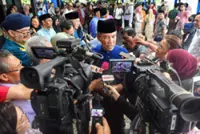WITH the Education Ministry set to discuss the 2027 national school curriculum during a nationwide roadshow next year, stakeholders are calling for an “earnest and sincere” process.
National Union of the Teaching Profession (NUTP) secretary-general Fouzi Singon said this is necessary for the future workforce to contribute to the country’s progress.
Uh-oh! Daily quota reached.










































